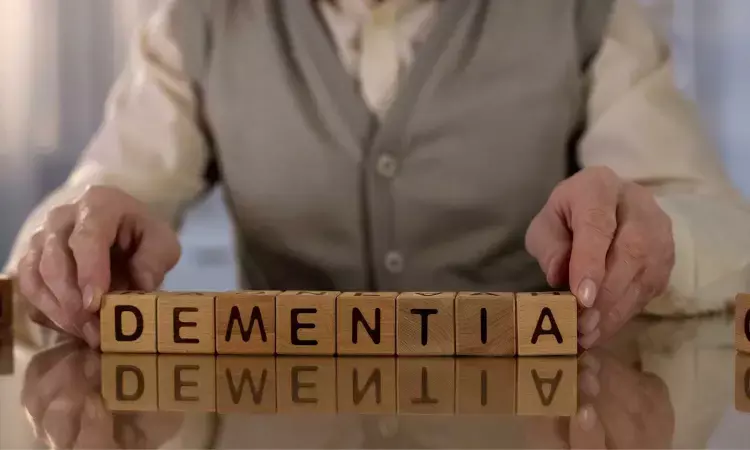- Home
- Medical news & Guidelines
- Anesthesiology
- Cardiology and CTVS
- Critical Care
- Dentistry
- Dermatology
- Diabetes and Endocrinology
- ENT
- Gastroenterology
- Medicine
- Nephrology
- Neurology
- Obstretics-Gynaecology
- Oncology
- Ophthalmology
- Orthopaedics
- Pediatrics-Neonatology
- Psychiatry
- Pulmonology
- Radiology
- Surgery
- Urology
- Laboratory Medicine
- Diet
- Nursing
- Paramedical
- Physiotherapy
- Health news
- Fact Check
- Bone Health Fact Check
- Brain Health Fact Check
- Cancer Related Fact Check
- Child Care Fact Check
- Dental and oral health fact check
- Diabetes and metabolic health fact check
- Diet and Nutrition Fact Check
- Eye and ENT Care Fact Check
- Fitness fact check
- Gut health fact check
- Heart health fact check
- Kidney health fact check
- Medical education fact check
- Men's health fact check
- Respiratory fact check
- Skin and hair care fact check
- Vaccine and Immunization fact check
- Women's health fact check
- AYUSH
- State News
- Andaman and Nicobar Islands
- Andhra Pradesh
- Arunachal Pradesh
- Assam
- Bihar
- Chandigarh
- Chattisgarh
- Dadra and Nagar Haveli
- Daman and Diu
- Delhi
- Goa
- Gujarat
- Haryana
- Himachal Pradesh
- Jammu & Kashmir
- Jharkhand
- Karnataka
- Kerala
- Ladakh
- Lakshadweep
- Madhya Pradesh
- Maharashtra
- Manipur
- Meghalaya
- Mizoram
- Nagaland
- Odisha
- Puducherry
- Punjab
- Rajasthan
- Sikkim
- Tamil Nadu
- Telangana
- Tripura
- Uttar Pradesh
- Uttrakhand
- West Bengal
- Medical Education
- Industry
GLP-1RA significantly reduces dementia and cognitive impairment in diabetic patients: JAMA

A new study published in the Journal of American Medical Association showed that glucagon-like peptide-1 receptor agonists (GLP-1RAs)-based glucose-lowering treatment was linked to reduction in dementia or cognitive impairment.
A risk factor for dementia, diabetes is thought to be responsible for around 5% of the population-attributable percentage of dementia cases. Also, diabetes increases the incidence of ischemic stroke, which may function as a mediator in the relationship between diabetes and vascular dementia.
The effectiveness of glucose-lowering medication in preventing incident dementia is unknown, despite the knowledge that diabetes is a risk factor for dementia. Thus, to ascertain whether cardioprotective glucose-lowering therapy (sodium-glucose cotransporter-2 inhibitors (SGLT2is), GLP-1RAs, metformin, and pioglitazone) was linked to a lower risk of dementia or cognitive impairment, as well as among the primary dementia subtypes, this study was carried out.
Studies published between the database's creation and July 11, 2024, were found by searching the PubMed and Embase databases. This study shortlisted randomized clinical trials that compared cardioprotective glucose-lowering treatment with controls who reported dementia or a change in cognitive scores.
Based on data from phase III randomized clinical studies, medication classes that are suggested by recommendations for decreasing cardiovascular events were referred to as cardioprotective glucose-lowering treatments. Independent evaluations of the inclusion criteria were conducted, and disagreements were settled by consensus.
12 trials evaluating SGLT2is, 10 trials evaluating GLP-1RAs, and 1 trial evaluating pioglitazone (no trials of metformin were found) were among the 26 randomized clinical trials (N = 1,64,531 participants) that reported the incidence of dementia or cognitive impairment. The mean (SD) age of the trial participants was 64.4 (3.5) years, and 57,470 (34.9%) of them were female.
Overall, there was no significant correlation seen between cardioprotective glucose-lowering medication and a decrease in dementia or cognitive impairment. GLP-1RAs, but not SGLT2is, were linked to a statistically significant decrease in dementia all medication classes. Overall, this meta-analysis revealed that glucose lowering with GLP-1RAs reduced all-cause dementia, even if cardioprotective glucose-lowering treatments were not linked to an overall decrease in the same.
Source:
Seminer, A., Mulihano, A., O’Brien, C., Krewer, F., Costello, M., Judge, C., O’Donnell, M., & Reddin, C. (2025). Cardioprotective glucose-lowering agents and dementia risk: A systematic review and meta-analysis: A systematic review and meta-analysis. JAMA Neurology. https://doi.org/10.1001/jamaneurol.2025.0360
Neuroscience Masters graduate
Jacinthlyn Sylvia, a Neuroscience Master's graduate from Chennai has worked extensively in deciphering the neurobiology of cognition and motor control in aging. She also has spread-out exposure to Neurosurgery from her Bachelor’s. She is currently involved in active Neuro-Oncology research. She is an upcoming neuroscientist with a fiery passion for writing. Her news cover at Medical Dialogues feature recent discoveries and updates from the healthcare and biomedical research fields. She can be reached at editorial@medicaldialogues.in
Dr Kamal Kant Kohli-MBBS, DTCD- a chest specialist with more than 30 years of practice and a flair for writing clinical articles, Dr Kamal Kant Kohli joined Medical Dialogues as a Chief Editor of Medical News. Besides writing articles, as an editor, he proofreads and verifies all the medical content published on Medical Dialogues including those coming from journals, studies,medical conferences,guidelines etc. Email: drkohli@medicaldialogues.in. Contact no. 011-43720751


